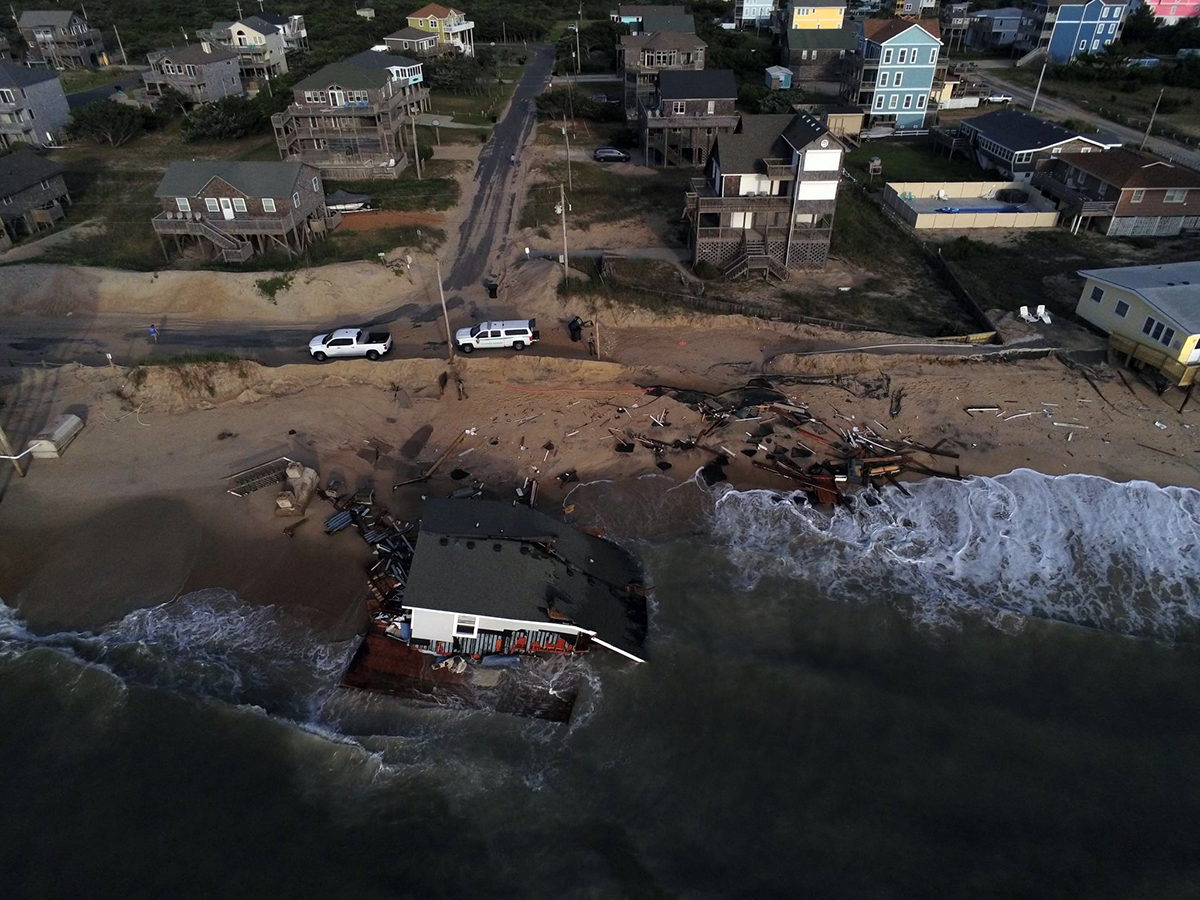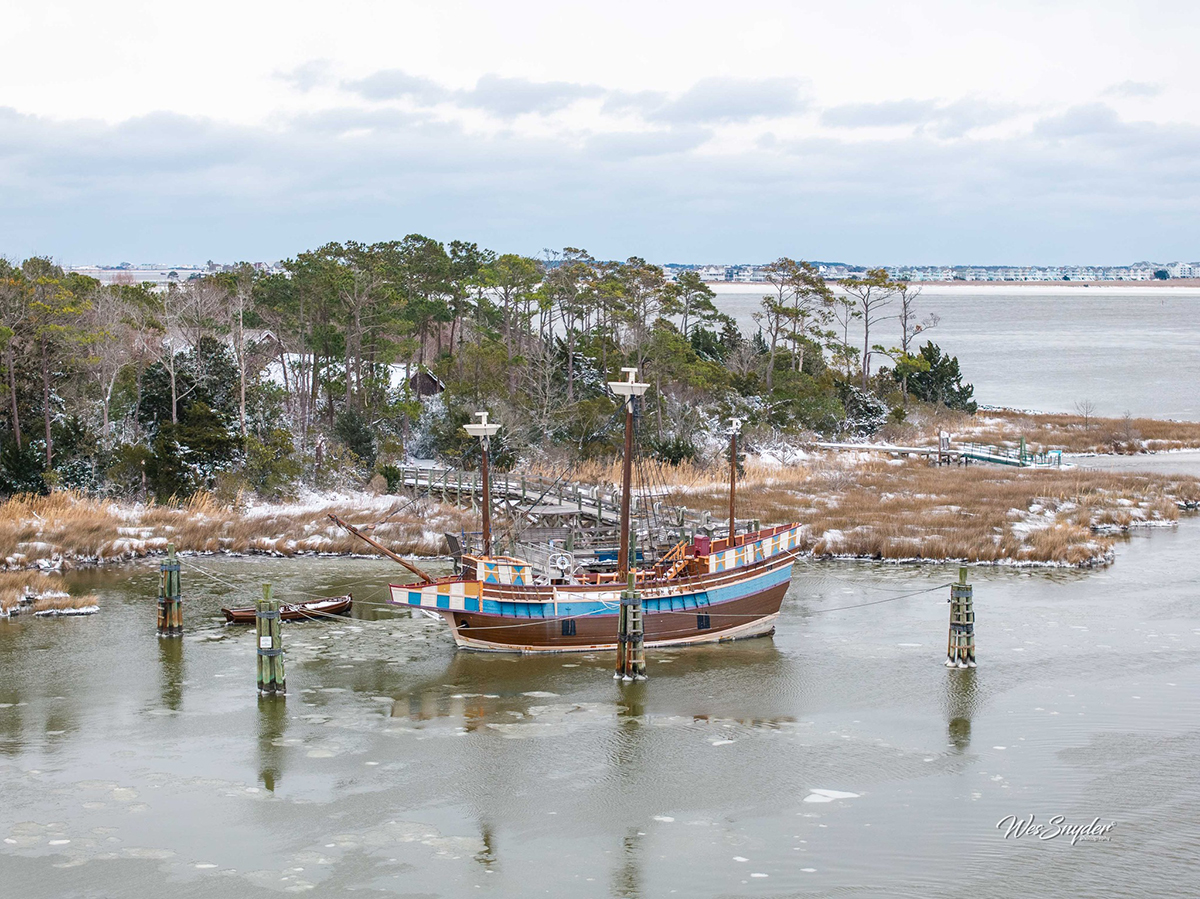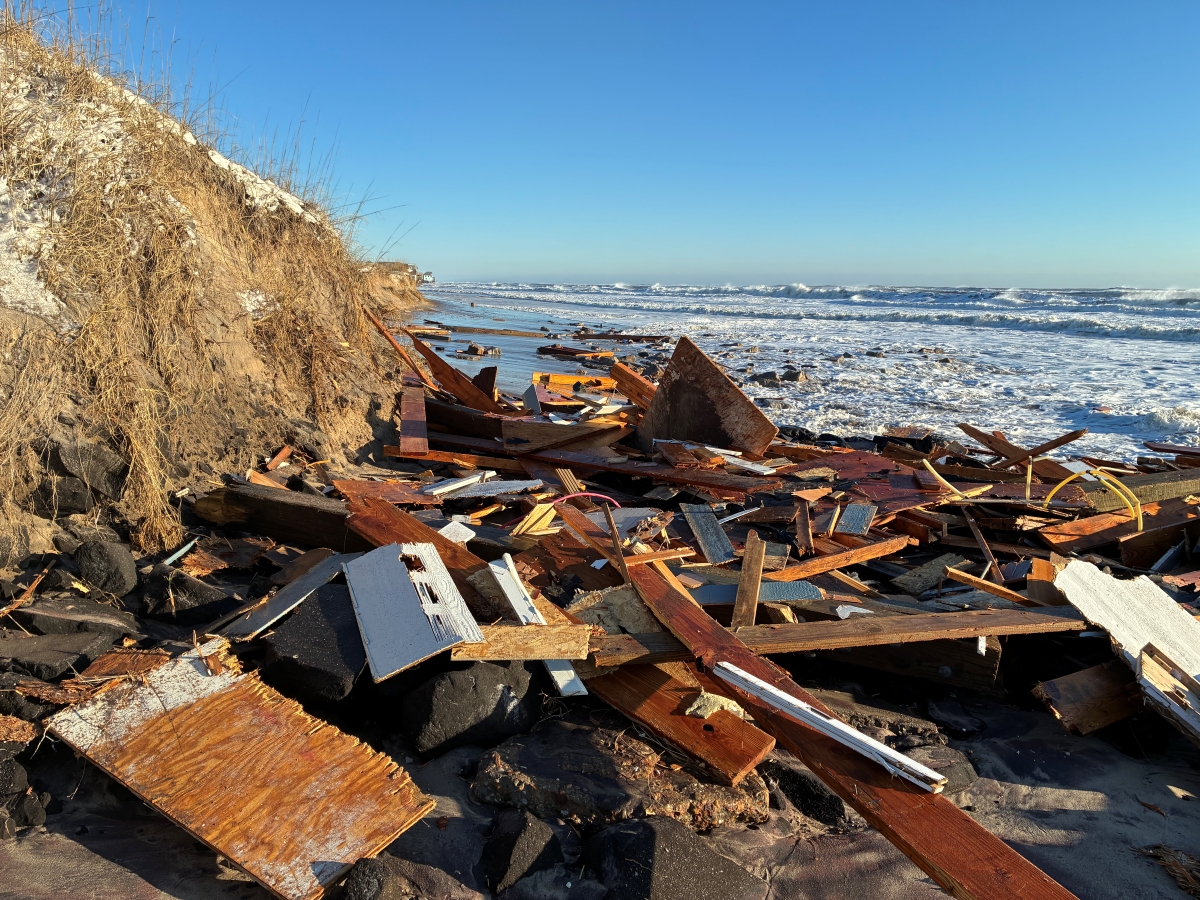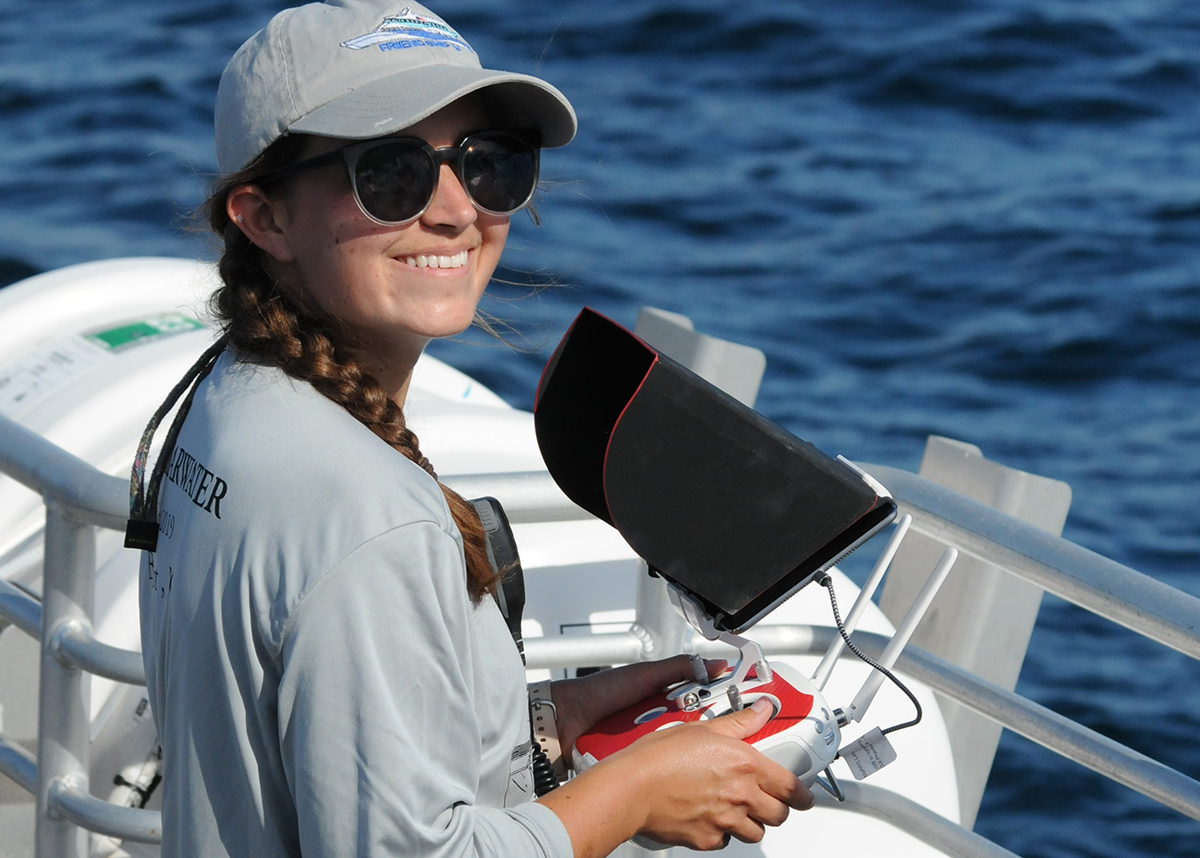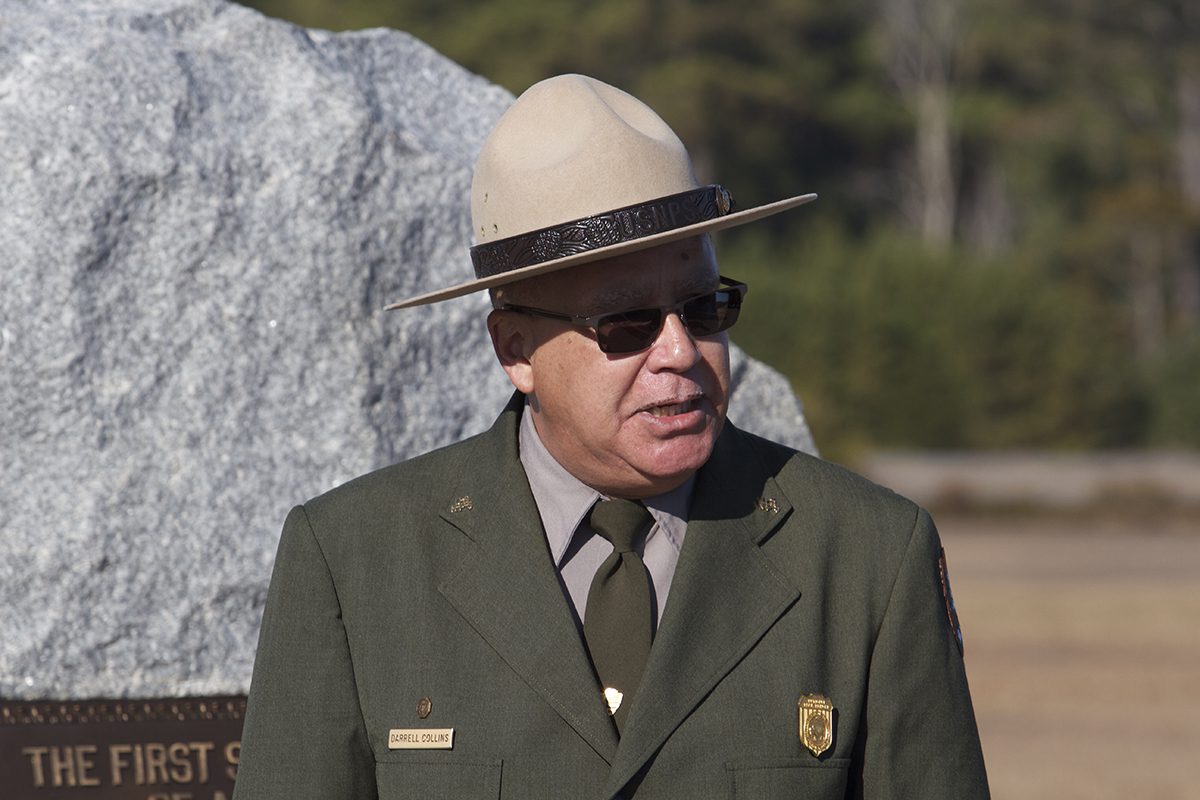
KILL DEVIL HILLS — It speaks to the storytelling talent of National Park Service interpreter and historian Darrell Collins that audiences listening to his talk about the Wright brothers’ aerodynamic breakthrough of roll, pitch and yaw would often have tears welling from their eyes by the end.
Collins, who won numerous national and international awards during his four-decade career with the agency, died in his Manteo home on Dec. 24 at age 69.
Supporter Spotlight
As sons of a preacher, with lives absent scandal or even romance, Wilbur and Orville Wright’s story of first flight might seem heavy on aviation physics and difficult to translate in an engaging way, Scott Babinowich, acting deputy superintendent with the National Park Service Outer Banks Group, said during a remembrance for Collins held Saturday at Wright Brothers National Memorial.
“But Darrell had a gift to take those challenging concepts and craft them in a way that’s relatable to everybody,” he told the audience that filled the park’s Flight Room, where Collins had given his talk “thousands of times to hundreds of thousands of visitors.”
“He found a way to blend science and history and art to paint a picture that resonated with everybody that entered this building.”
Babinowich noted that in an agency as large as the park service, “it is rare to find a park ranger who had such a lasting impact in a single park” the way Collins did. With his easygoing approach, Collins had a way of enabling listeners to see themselves in the Wrights’ story, but also to give them a reason to “care and cherish the monumental achievement,” Babinowich said.
After four years of experiments on the Outer Banks, the Wrights achieved the first powered and controlled manned flight on Dec. 17, 1903, at what today is Kill Devil Hills.
Supporter Spotlight
A video of a brief portion of a Flight Room talk played during the remembrance shows Collins, wearing white conservator gloves and dressed in his olive-green and tan park service uniform, standing next to a full-size model of the 1903 Wright Flyer. Speaking in a soft Southern accent, he demonstrates how the pitch of the plane was controlled with a stick, which he then starts moving back and forth, accompanied by rhythmic squeaking as parts in the front of the aircraft respond.
Much of Collins’ mastery of his presentation was in his understated style that both moderated and modulated his speech and body language, building from an even cadence and simple demonstrations with his hands to closing with an intensified voice, soaring language and dramatic, sweeping arm gestures. Like a natural storyteller, he never faltered as he spoke. He employed gentle humor. And he used space between words and sentences to create the rhythmic cadence of a preacher.
“The elevator controls the pitch,” he says on the video, pausing as he slowly raises his right arm, “of the machine.”
“Take off and landing.” He slowly drops his arm.
“This motion of an airplane in flight …” he pauses as he moves his arm up faster, “is controlled by the elevator.”
As part of his typical 20- to 30-minute talk, Collins would bring the audience, almost imperceptibly, to seeing the Wrights’ feat in the context of humanity: the men, their family and their country.
He would talk about the intense competitive nature of aviation and science at the turn of the 20th century; of the contributions from the Outer Banks community; of the brilliance, fortitude and ingenuity of the brothers; and of the loyalty the brothers had to one another and their family.
He attributed the Wrights’ success to their willingness to persist, even after numerous disappointments, as well as their high character and extraordinary dedication to solving the mystery of flight.
At this point, Collins would start speaking a bit louder and faster, telling of how dramatically the two publicity-shy brothers from Ohio changed the world that day in 1903 at the sandy outpost on the Outer Banks. Visitors in the Wright Brothers Flight Room could see the exact spot right outside the large windows where the Wrights’ plane first found lift.
Indeed, as Collins would say in closing, it took just 66 years from the brothers’ first 12-second flight until the Apollo landing on the moon. That fact alone makes the Wrights’ invention Earth-shattering. But that’s not all, Collins would remind his rapt audiences.
“Folks, just about everything that flies — satellites, missiles, rockets, space shuttles — use the same fundamental principles,” Collins said in the 2014 Flight Room talk.
“You see,” he would add emphatically, his voice rising, “this is the immortal legacy of the Wright brothers.”
Often, people in the audience would sit quietly for a moment after Collins finished, dabbing their eyes.
Dave Hallac, superintendent of the park service Outer Banks Group, recounted after the remembrance how he had been at an agency event out of the area shortly after arriving on the Outer Banks when he mentioned his connection to the Wright Brothers park. The person he was speaking to responded that she had heard a talk there that had left her in tears. Hallac, who had not yet seen Collins’ presentation, apologized for the ranger upsetting her. But he had misunderstood.
“She said, ‘It was one of the most inspiring talks I’ve ever heard,’” Hallac recalled, adding about Collins: “He’s a legend. His ability to tell the Wright brothers’ story was unparalleled.
A native of Manteo with family roots dating back to the 1863-1867 Roanoke Island Freedmen’s Colony, a community of formerly enslaved people and free Black people, Collins graduated from Elizabeth City State University with a bachelor’s in geology and history. In 1977, he started work as a seasonal park ranger on the Outer Banks and set his sights on securing a permanent position as a history interpreter.
Early on, Collins had told interviewers that he was influenced by Paul Garber and Charles Harvard Gibbs-Smith, both well-known aviation historians and celebrated speakers. Although Collins soon gained acclaim for his speaking skills and as an expert on Wright brothers history, his fame shot up to international levels in the lead-up to the Centennial of First Flight in 2003.
Collins’ secret was that he was just “doing what he loved,” his wife Tonya Collins said after the event.
“It was just his passion for the Wrights, for choosing this place when they did,” she said. “He had a sense of pride in this place and its people. He was proud of the people here and that he was part of these people.”
According to his obituary, Collins was considered as one of the top three Wright brothers historians in the world. Even after retiring in 2017, he continued traveling to give lectures on the Wrights for five years. He was also a regular speaker for 35 years at the “Speakers’ Showcase Series” at the Experimental Aircraft Association’s annual Oshkosh Fly-In in Wisconsin.
His many awards include the Experimental Aircraft Association’s President’s Award, the Freeman Tilden Award as the park service’s top interpretive ranger in 1990, and in 2003, both the Order of the Long Leaf Pine by the North Carolina governor, and the Paul Tissandier Diploma by the National Aeronautic Association.
Collins also served for 18 years on the Manteo Board of Commissioners, filling the same seat on the town board that his mother Dellerva had held for 26 years before her death in 2005. In addition, he was the founder and president of the Pea Island Preservation Society Inc., a nonprofit dedicated to the Pea Island Lifesaving Station, the only all-Black station in the nation.
Collins, who had family connections to Pea Island, had taught the story of Keeper Richard Etheridge and the Pea Island Lifesavers to Dare County fourth graders.
Tonya Collins, who was married to Darrell for 22 years, said that her husband’s modest and friendly demeanor was genuine. Similar to his mother Dellerva, he never got angry, she said.
“He was truly raised by a kind person,” she said. “He came by it quite honestly.”




